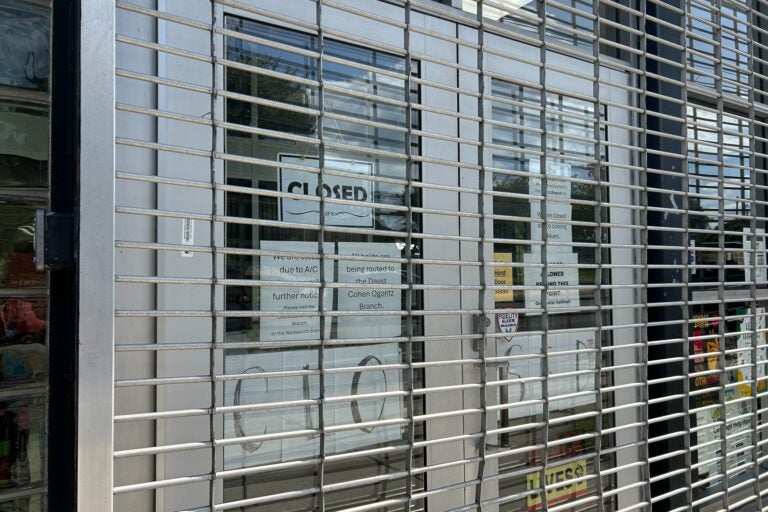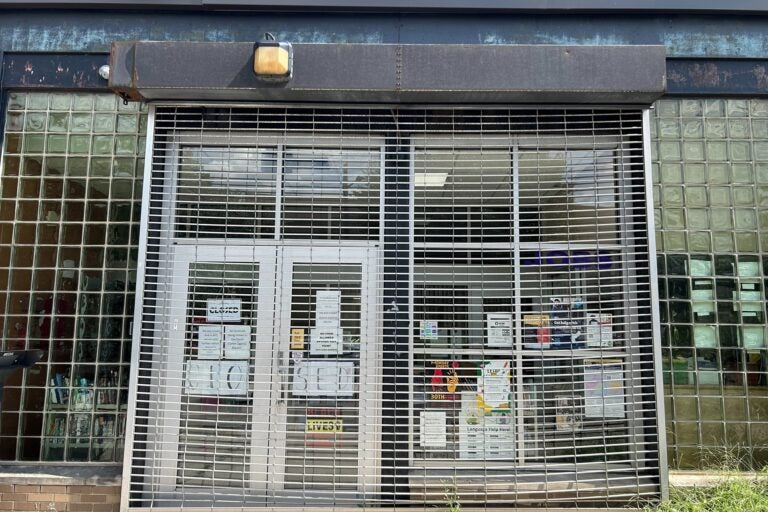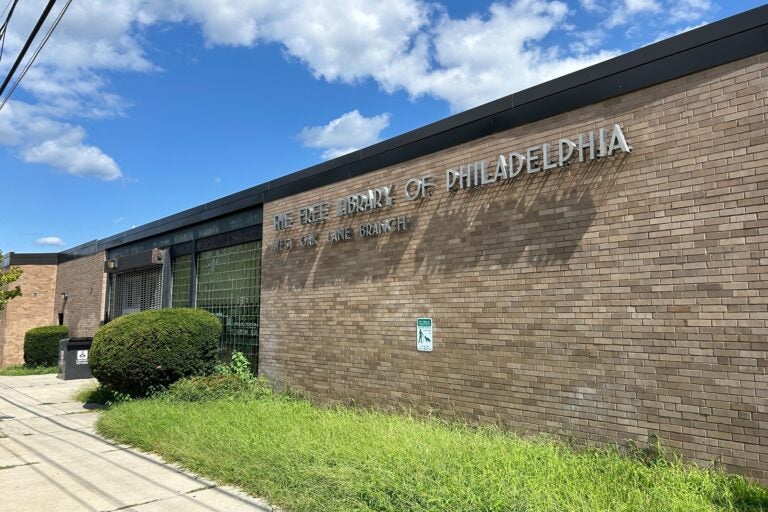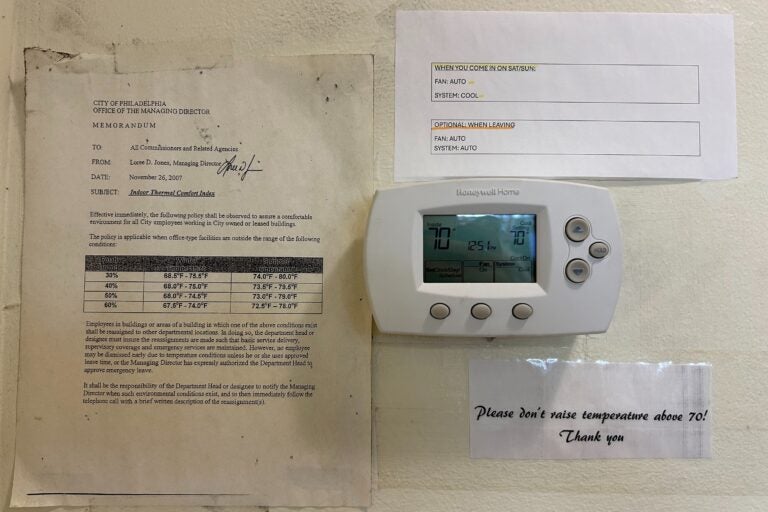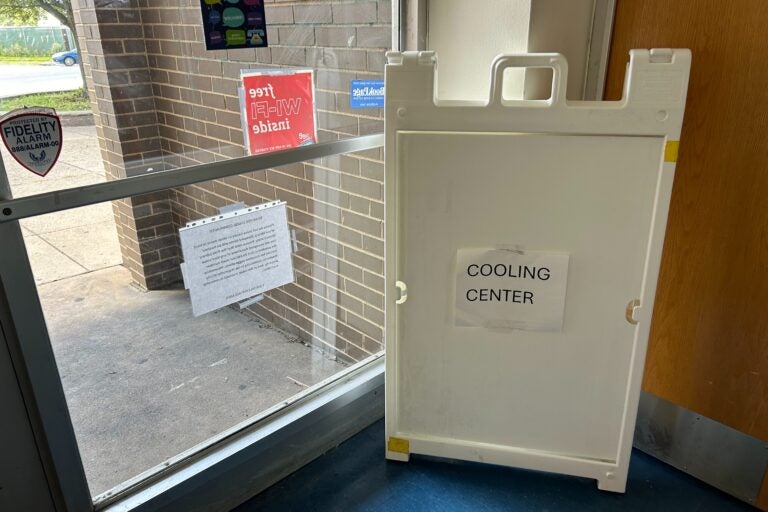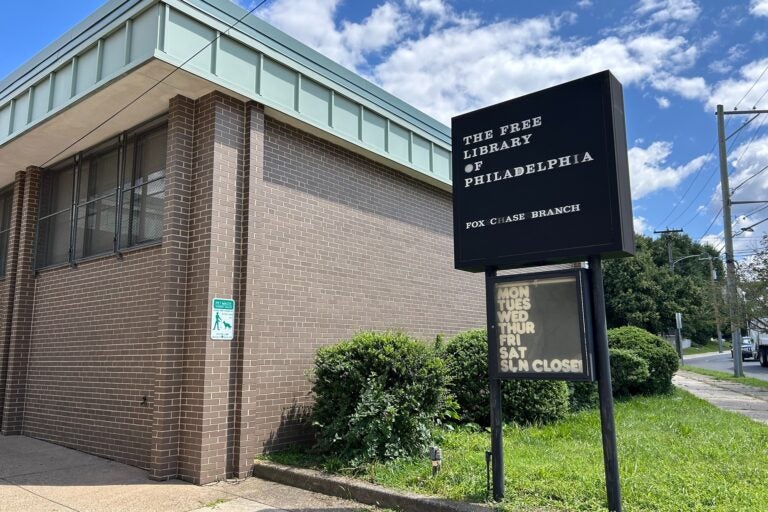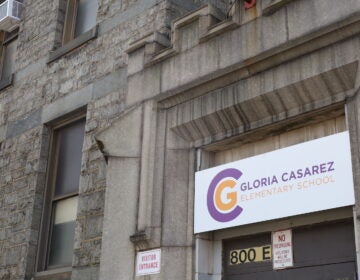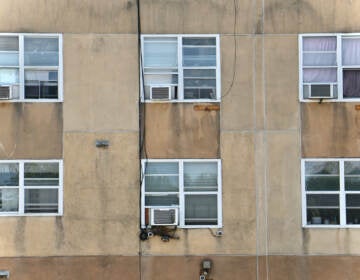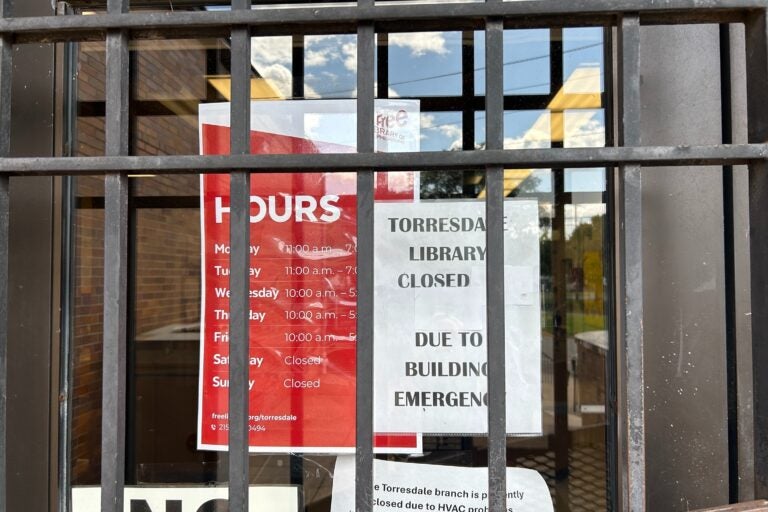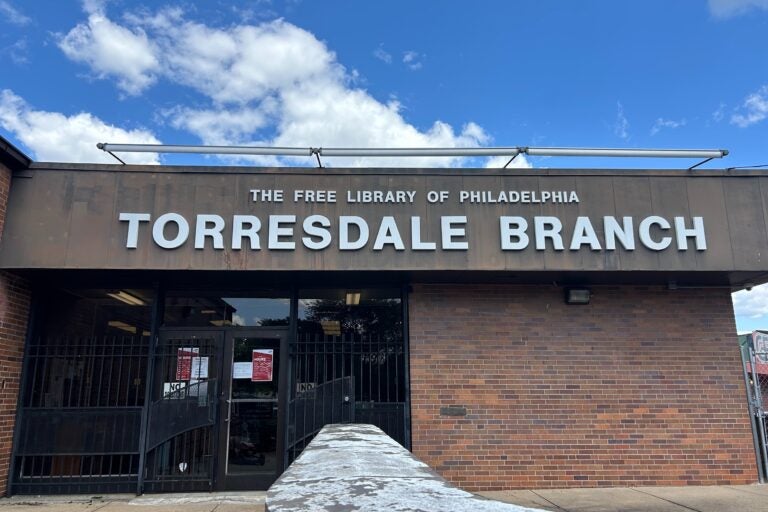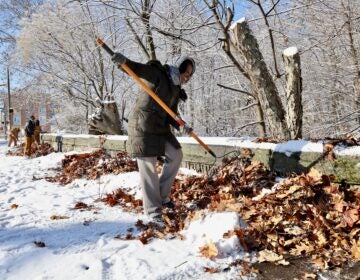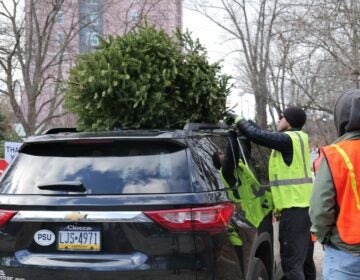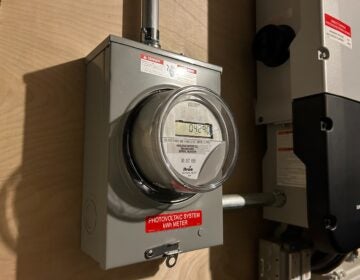‘Completely unacceptable’: Nearly two dozen Philly libraries closed this summer due to A/C issues
Philly libraries are used as cooling centers during extreme heat. But many have unreliable A/C.
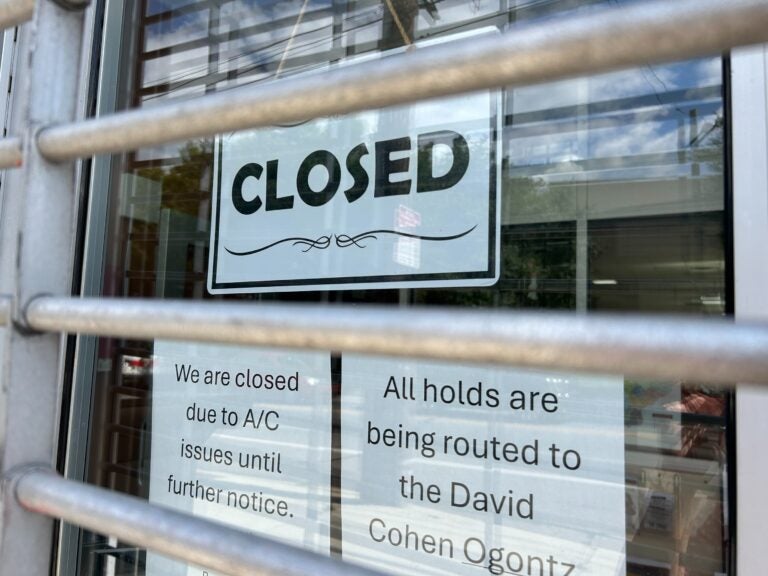
As of Wednesday, the West Oak Lane Library had been closed for more than seven weeks due to air conditioning issues. (Sophia Schmidt/WHYY)
Have a question about Philly’s neighborhoods or the systems that shape them? PlanPhilly reporters want to hear from you! Ask us a question or send us a story idea you think we should cover.
At a busy intersection in Northwest Philadelphia last week, the West Oak Lane Library sat quiet, its windows dark and a metal security grille pulled down over its doors.
A piece of paper taped to the door read, “We are closed due to A/C issues until further notice.” It had been seven weeks since the branch first shuttered July 5.
West Oak Lane is just one of 20 library branches — more than a third of Philadelphia’s public libraries — that closed this summer due to broken or inadequate air conditioning, according to the city’s Office of Children and Families, which oversees the Free Library of Philadelphia, and the Free Library’s website.
Some, like Charles Santore Library in South Philly and Independence Library in Center City, closed for just one day, according to the office. But others, including Overbrook Park Library in West Philly, Falls of Schuylkill Library in Northwest Philly and Fox Chase Library in Northeast Philly, closed for weeks at a time, depriving neighbors of educational programming, resources like job search assistance, access to computers, free Wi-Fi, public restrooms and a refuge from summer heat and rain.
“I just find that completely unacceptable,” said Elizabeth Gardiner, a librarian in the River Wards section. “People should be able to rely on us.”
Gardiner and other library workers who spoke with WHYY about the closures did so as members of AFSCME District Council 47, a union representing close to 300 Philly library employees, because they were not authorized to speak on behalf of the Free Library.
Several of the libraries that closed at some point during the summer were designated as cooling centers during city-declared Heat Health Emergencies.
On Wednesday, when an excessive heat warning blanketed the region and temperatures soared to 96 degrees. Richmond and McPherson Square libraries closed for at least part of the day due to HVAC issues. Fox Chase, which had been designated a cooling center during heat waves earlier this summer, also closed early. Two libraries — Torresdale and West Oak Lane — remained closed since they first shuttered due to A/C problems in early July.
The closures reveal the limits of libraries’ ability to serve as safe havens in the face of rising temperatures and more extreme rain due to human-caused climate change.
Jessica Shapiro, assistant deputy managing director at the Office of Children and Families, said in a written statement that the city is “doing everything possible” to keep air conditioning working and libraries open at all times.
“Our libraries offer enriching programming for children, families and adults of all ages,” Shapiro said. “Although it has been an extremely warm summer and the air conditioning was forced to work extra hard to keep buildings cool, it is a top priority for the city to keep our libraries open and available to the public.”
Cooling centers with unreliable A/C
Several of the libraries that closed this summer due to inadequate air conditioning were advertised as city cooling centers during heat waves.
When summer temperatures become dangerous, the city declares a Heat Health Emergency, opening cooling centers as places where residents without A/C at home can cool off. City cooling centers mostly consist of spraygrounds and extended hours at existing pools, rec centers, PHA senior sites, older adult centers and libraries.
The city declared two Heat Health Emergencies this summer: one in late June and a second in mid-July. For each, officials designated roughly a dozen libraries as cooling centers with extended hours.
Fox Chase Library in Northeast Philadelphia was designated a cooling center during both, but closed during the last day of the July emergency due to cooling issues, according to OCF.
“It hurts,” said staffer Allegra D’Ambruoso, speaking as a member of AFSCME DC 47 Local 2186. “We’re supposed to be here for the community.”
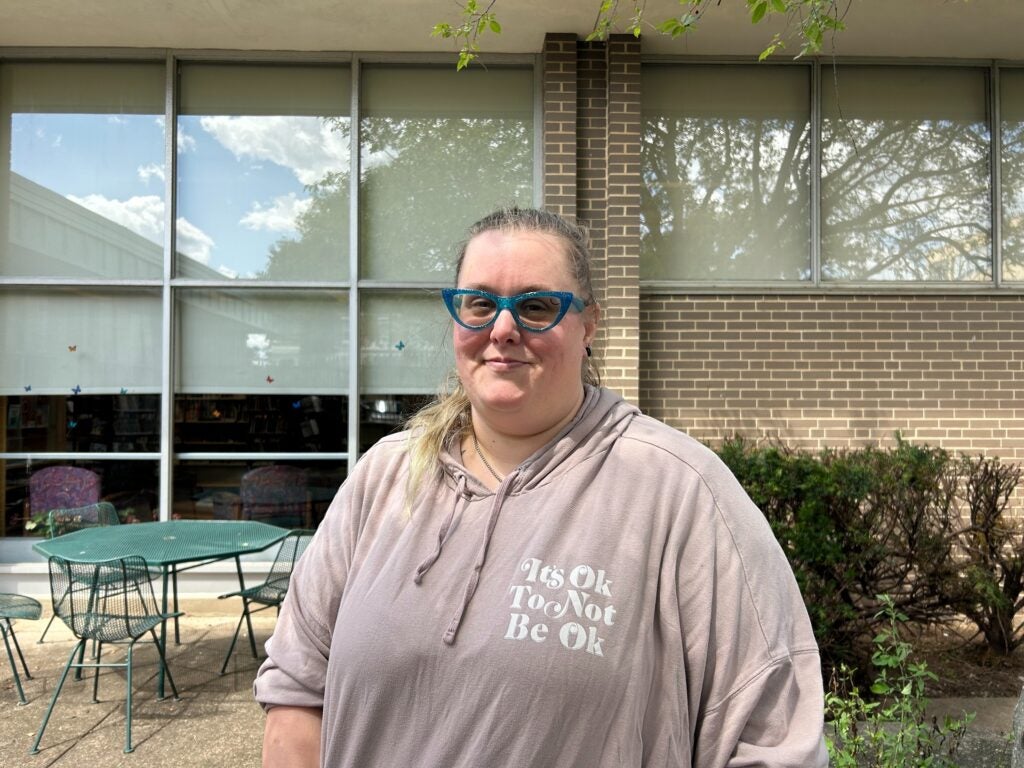
The windows of the one-story building don’t open. So when one of the library’s two A/C compressors broke, D’Ambruoso said that the temperature and humidity inside started to climb. With several hours left before the city’s Heat Health Emergency declaration was set to expire, staff told roughly two dozen patrons using the library to leave, she said.
“Even though they’re sitting here like sweating, it’s hard to say to them, ‘We have to close,’” D’Ambruoso said.
Four other libraries designated as cooling centers in June — Charles Santore, Cecil B. Moore, Joseph E. Coleman Regional and Walnut Street West — closed for at least one day later in the summer because of failing A/C.
Why libraries close
When temperatures and humidity within a library building exceed guidelines set by the city, which call for temperatures to not exceed 80 degrees, discussions begin about whether to temporarily close a branch, Free Library officials said.
Free Library staff try to keep the space within the guidelines — for example, by installing portable dehumidifiers, said Deputy Director of Property Management Ty Dupass.
But in some libraries, windows do not open, so broken air conditioning can mean there’s no way to get fresh air into the building, he said.
If the issue cannot be quickly resolved, the branch will close, said Free Library spokesperson Laila Sadat, to make sure “not just visitors and patrons are comfortable, but that staff are able to do their jobs.”
Dupass said hot temperatures this summer challenged library air conditioning systems. Since June, Philadelphia has seen over a dozen days that topped 95 degrees — among the most on record.
“We have unusual high temperatures and humidity levels that the system may or may not be able to handle,” he said.
When a library designated as a cooling center experiences an unexpected HVAC issue that cannot be quickly resolved, the Free Library tries to designate another nearby library as a replacement cooling center, Sadat said.
‘Missing out on a community space’
Neha Pancholi, a science writer who lives less than two blocks from the Falls of Schuylkill Library in East Falls, takes her 2-year-old daughter to the library each week to pick out books to read at bedtime.
“She asks to go and is always super proud to walk up with her library card to check out the books herself,” said Pancholi, who’s vice president of the Friends of the Falls of Schuylkill Library. “Between the books and just a new experience of being outside the house in a different setting, the toys there, the other kids, it’s definitely an incredibly stimulating and fun activity for her to do every week.”
But the Falls of Schuylkill Library’s closure for almost a month starting in mid-July meant the pair missed out on their weekly routine.
At other branches, the cooling-related closures also canceled events such as chair yoga, LEGO club for kids, gaming club for teens and literacy programming for babies. The closures also meant people missed out on basic services.
“There are some patrons who come in here almost every day to use the computers,” said D’Ambruoso, the staff member at a library in the Northeast that closed for weeks.
Multiple library closures in the Northeast left patrons there with few places to go.
“We’ll see some of the same kids, like teenagers or tweens, who come in, and they’re wandering around the neighborhood not doing much and then they come in and hang out for a little bit,” D’Ambruoso said. “At least they’re nice and safe here. We have a vibrant community of seniors who come in every week. So they’re missing out on a community space.”
At Cecil B. Moore in North Philly, staff decided to keep the library open despite the decades-old air conditioner not working at full capacity for most of the summer, said librarian Kate Goodman, speaking as a member of AFSCME DC 47 Local 2187. Goodman said on a typical summer day, dozens of patrons come to the library, including many kids out of school for the summer and older adults.
“If we weren’t open those days … the kids might be forced to go outside or to the park,” Goodman said. “Adults wouldn’t be getting key services they need like computer services and printing and a place to hang out.”
Staff feel ‘abandoned’
Some library staff feel frustrated over what they see as persistent facilities issues that are patched up, rather than fixed for good.
Issues with part of the Fishtown Community Library’s HVAC system meant the building became abnormally humid many days early this summer, said Gardiner, the librarian speaking as a member of AFSCME District Council 47 Local 2186.
Staff began to notice book pages wrinkling, mold growing on the wall of an office and a musty smell in a carpeted area — raising concerns about health, she said. The issue has since been resolved with portable dehumidifiers.
“It was very concerning,” Gardiner said. “It seems very unlikely that we’re going to get that money together to get a comprehensive repair, and we’ll just keep on putting Band-Aids on.”
At Cecil B. Moore, where the aging A/C system meant the building was hot for much of the summer, staff felt demoralized, Goodman said. The library’s play space for kids — with a rock-climbing wall and other elements that encourage physical play — made the heat even harder to endure.
“It gets exhausting,” she said. “When you’re a librarian or other library staff, you’re not sitting down all day at a desk. I’m helping kids do hula hoops and showing them how to use a rock climbing wall. It’s hot and tiring, and you get thirsty.”
“It’s very clear that the city doesn’t care about us,” she added. “You just feel kind of abandoned and hopeless.”
The city’s plan to fix the issue
The Free Library is working to replace HVAC systems throughout the city, but each individual library branch needs its own facility assessment, Dupass said. He characterizes it as an ongoing process.
“We’re working with engineers to design resilient systems that can withstand the type of weather we’re getting and today’s climate,” he said. “It’s a holistic approach … It takes time.”
Meanwhile, staff are working to reopen the branches that remain closed due to air conditioners that broke this summer.
“A lot of it is parts, supply chain,” Dupass said. “While we’re waiting for parts, we try to think of other ways we can keep the branch working.”
The city installed a portable A/C unit at Torresdale, is awaiting replacement parts for the HVAC system at Overbrook Park Library and is working on a building automation and HVAC replacement project at West Oak Lane Library, expected to be finished by early next year, officials said Tuesday.
Fishtown Community Library is also scheduled for HVAC renovations by early next year. The Rebuild project at Cecil B. Moore Library, currently in the engagement and design phase, will also include HVAC renovations.
Still, library staff and advocates have called for a bigger long-term investment in library facilities.
Last year, Philly’s chapter of the Sunrise Movement rallied at City Hall, demanding more staff so that libraries can stay open longer hours and a massive bump in capital spending that would see libraries and rec centers retrofitted by 2030, with climate-friendly heat pumps to both heat and cool buildings, basic repairs, solar panels, insulation and flood resiliency upgrades.
Under the capital program City Council passed this summer, the Free Library system is expected to get more than $54 million in capital improvements over the next six fiscal years — $8 million of which has been committed to HVAC projects, Sadat said.
“They’ve been operating on a shoestring budget for a really long time,” Goodman said. “It’s just not enough.”

Get daily updates from WHYY News!
WHYY is your source for fact-based, in-depth journalism and information. As a nonprofit organization, we rely on financial support from readers like you. Please give today.




